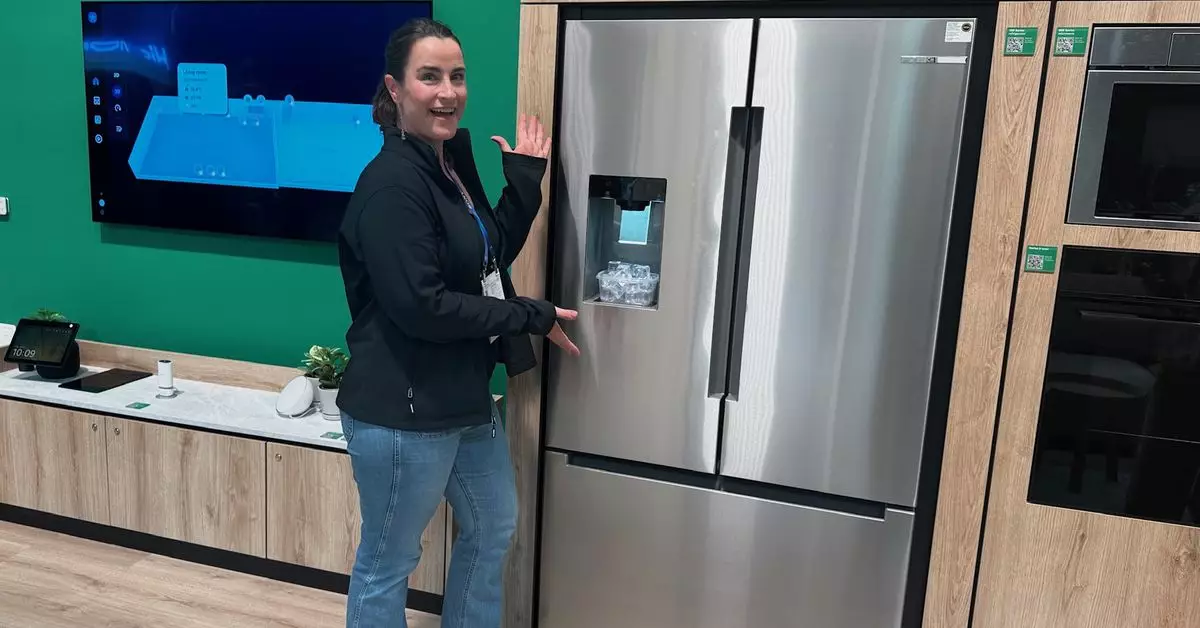As the world embraces an increasingly connected lifestyle, the importance of interoperability within smart home devices cannot be overstated. Consumers today expect seamless integration across various systems and platforms. Appropriately, Bosch, a leader in home appliances, is making waves at this year’s CES by unveiling their first Matter-enabled refrigerator, specifically the 100 Series French Door Bottom Mount Refrigerator. This model not only represents Bosch’s commitment to innovation but also signifies a more interconnected future in smart home technology.
Launched in November and expected to hit the shelves in the U.S. this spring, the 100 Series refrigerator is priced at $2,500 and is designed with forward-thinking technology, embedding a chip that supports the Matter standard. Unlike traditional smart appliances that rely heavily on cloud connectivity, these Matter-enabled devices promise faster and more secure local communication, which speaks volumes in terms of user automation and efficiency.
Eelco Lammertink of BSH, Bosch’s parent company, emphasizes the commitment to expanding Matter compatibility across all appliance lines, including Siemens and Thermador. The refrigerator serves as the pioneer, paving the way for upcoming products in the lineup. It notably allows users to adjust temperature settings and receive notifications from their smart home ecosystem, exhibiting the conveniences of modern-day kitchen management.
Matter is not merely a trend; it is a robust interoperable smart home standard backed by tech giants such as Apple, Amazon, Google, and Samsung. Its purpose is to furnish a common framework that allows multiple smart devices to communicate without the limitations of cloud dependency. For homeowners, this translates to enhanced privacy, increased security, and the efficiency of managing connected devices in a streamlined manner.
The significance of Matter lies in its compatibility with various device types, ranging from lighting and locks to kitchen appliances and air quality monitors. According to Lammertink, Matter 1.3—which will support the 100 Series—shows that Bosch aims to become an integral part of the broader home automation ecosystem. Notable features include the refrigerator’s ability to notify the user when the door is left open, enhancing everyday usability and convenience.
While the Matter-enabled 100 Series refrigerator marks a significant innovation, there are limitations. Lammertink noted that existing appliances will not be retrofitted to support Matter due to the complexities and risks involved. This poses a challenge for consumers who wish to upgrade functionalities without needing to purchase entirely new appliances. The issue of ‘bricking’—rendering a device inoperable due to failed updates—remains a major concern in the tech industry.
Despite these drawbacks, the potential for Bosch to leverage Matter capabilities is enormous. The integration of energy management systems into smart refrigerators suggests that the appliance of the future will not only provide food preservation but will also contribute to household energy efficiency. The aim is to create a Matter-enabled energy ecosystem, facilitating real-time energy reporting, which enhances user control and sustainability.
The introduction of Matter-compatible appliances is a response to a growing demand among consumers for ecosystem compatibility. Currently, platforms such as Samsung SmartThings and Home Assistant have begun to adopt Matter, while Amazon is expected to follow suit shortly. However, there are still gaps, with notable platforms like Google Home and Apple Home yet to confirm support for appliances. As this standard gains momentum, consumers could find themselves with greater choices in their quest for an integrated smart home.
Moreover, Bosch’s competition in this sector will play a vital role in shaping the future of smart appliances. The direction companies take, whether they prioritize retrofitting older models or focusing strictly on new releases, will significantly impact market dynamics and consumer options.
Bosch’s debut with the 100 Series French Door refrigerator reinforces the shift towards connected home appliances that prioritize user experience, security, and energy management. As the landscape of smart home technology progresses, the commitment to Matter compatibility could signify a long-awaited evolution in how households interact with appliances. With increased interoperability, the future of refrigeration and home automation appears not only promising but essential for modern living.

